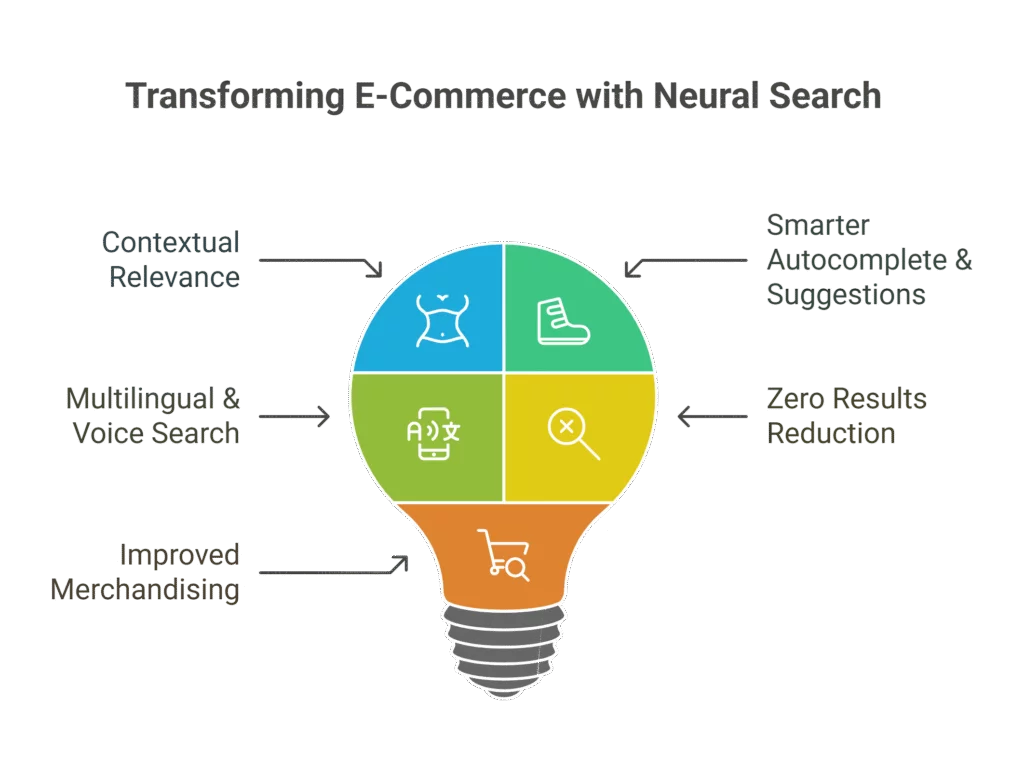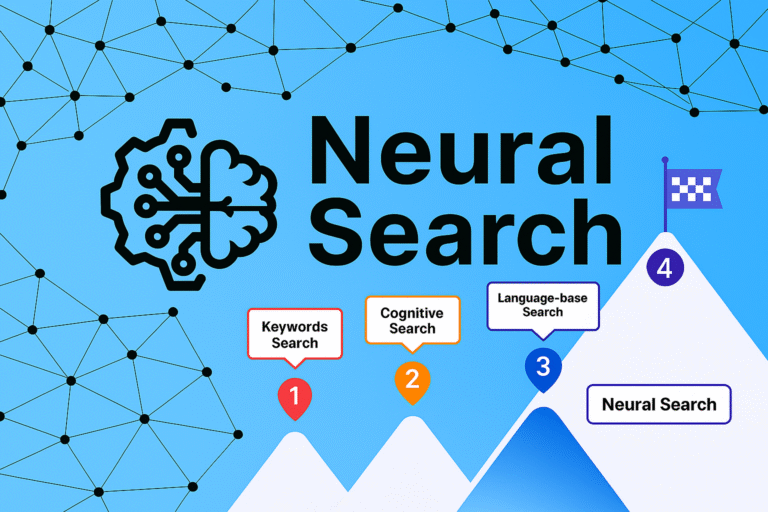The e‑commerce race isn’t just about who sells the best, it’s about who connects the fastest. In a world where shoppers demand hyper-relevant results in milliseconds, neural search has emerged as the revolutionary force re-engineering how product discovery works.
Forget clunky keyword matches and basic autocomplete. Neural search is driven by deep learning. It understands context, nuance, and intent, translating human language into smarter, more intuitive product discovery.
If your on-site search still relies on keyword logic, you’re leaving conversions and loyalty, on the table. Let’s decode what this search is, how it works in e‑commerce, and why it’s your secret weapon for higher ROI.
What Is Neural Search?
It is a search technology that uses artificial neural networks, specifically deep learning models to understand and match user queries with relevant results. Unlike traditional keyword-based search, which matches literal terms, this search captures semantic meaning and user intent.
It’s built on natural language processing (NLP), transformer models (like BERT or GPT), and vector search. Rather than matching strings, it matches meanings. That’s huge.
Neural Search vs Traditional Search
| Feature | Traditional Search | Neural Search |
|---|---|---|
| Matching method | Keyword match | Semantic match |
| Query understanding | Literal | Context-aware, intent-driven |
| Spelling/synonyms handling | Manual setup needed | AI-driven, automatic |
| Result ranking | Rule-based | Relevance learned from user behavior |
| Adaptability | Static | Learns and improves with time |
How Neural Search Works (Simplified)
Let’s break it down into four core stages:
1. Embedding Generation
Words, products, and queries are converted into high-dimensional vectors using pre-trained models like BERT. These embeddings encode semantic meaning, not just words, but relationships.
Example:
“Affordable wireless earbuds” becomes a vector close to “cheap Bluetooth headphones.”
2. Query Understanding
This search interprets intent. It looks at the whole sentence, not just isolated words, to understand the user’s goal.
“Dress for winter weddings” ≠ “wedding dress in winter”
Neural models catch that nuance.
3. Similarity Matching
The engine computes similarity between the query vector and product vectors using methods like cosine similarity. The closer the match, the higher the result ranks.
4. Re-ranking via ML
This search models can re-rank results based on real-time feedback: click-through rate, add-to-cart behavior, or past shopper patterns.
Why Neural Search Is Game-Changing for E‑Commerce

1. Contextual Relevance
Neural engines understand product intent and shopper language.
Query: “Workout tops that don’t show sweat”
Response: Moisture-wicking, breathable fabrics—even if “sweat” isn’t in the product title.
2. Smarter Autocomplete & Suggestions
Neural engines auto-suggest based on patterns, seasonality, and contextual learning—like offering “black boots for snow” in winter.
3. Robust Multilingual & Voice Search
They understand non-English phrases, accents, and even conversational queries like:
“Got anything cozy for a rainy day?”
4. Zero Results Be Gone
By understanding intent and expanding synonyms dynamically, neural search significantly reduces “no results found” scenarios.
5. Improved Merchandising Opportunities
Neural models surface high-intent products faster, guiding users from search to checkout in fewer steps.
Use Cases of Neural Search in E‑Commerce
- Fashion: Search for “eco-friendly party wear” returns ethical brands with glitzy options.
- Electronics: “Gaming laptops that don’t overheat” highlights thermal specs and reviews.
- Beauty: “Foundation for oily skin” prioritizes mattifying products, even if the product title lacks “oily.”
- Home décor: “Compact desk for studio apartment” shows small-size, multi-functional furniture.
Integrating Neural Search with Expertrec
Looking to adopt this search without building a team of ML engineers? Expertrec offers a seamless way to bring AI‑powered search to your e‑commerce storefront.
Here’s what Expertrec delivers:
- AI-powered search that understands shopper intent
- Real-time autocomplete and suggestions fine-tuned by behavioral data
- Faceted filtering integrated with neural relevance
- Customizable vector search stack with minimal dev work
- Analytics dashboard showing top queries, filters, and drop-offs
Whether you’re scaling a boutique Shopify store or managing a multi-brand enterprise, Expertrec equips you with neural precision, faster deployment, and shopper-first experiences.
Conclusion: Neural Search Is the Future, Are You Ready?
Neural search isn’t just a tech upgrade, it’s a customer experience revolution. In e‑commerce, where intent, context, and speed define conversion, this search is your edge.
By decoding shopper needs with AI and surfacing results that feel intuitive, personal, and instant—you don’t just improve search. You elevate your entire brand experience.
And if you’re ready to future-proof your store, Expertrec’s neural search solution is built to do just that—without the complexity.
Frequently Asked Questions
1. Is neural search only useful for large e‑commerce sites?
No, small to mid-sized stores can benefit by offering more relevant results and fewer dead ends.
2. Can this search handle long-tail queries?
Yes. It’s particularly effective at interpreting natural language and nuanced, multi-word searches.
3. Does neural search replace faceted filtering?
Not at all. In fact, this search complements faceted navigation, offering smart results followed by intuitive refinement.
4. How does neural search improve SEO?
It improves user engagement, reduces bounce, and increases time-on-site—metrics Google watches closely.
5. How quickly can I implement this smart search with Expertrec?
Typically within days. Expertrec’s platform is plug-and-play, requiring minimal dev effort with maximum result impact.




